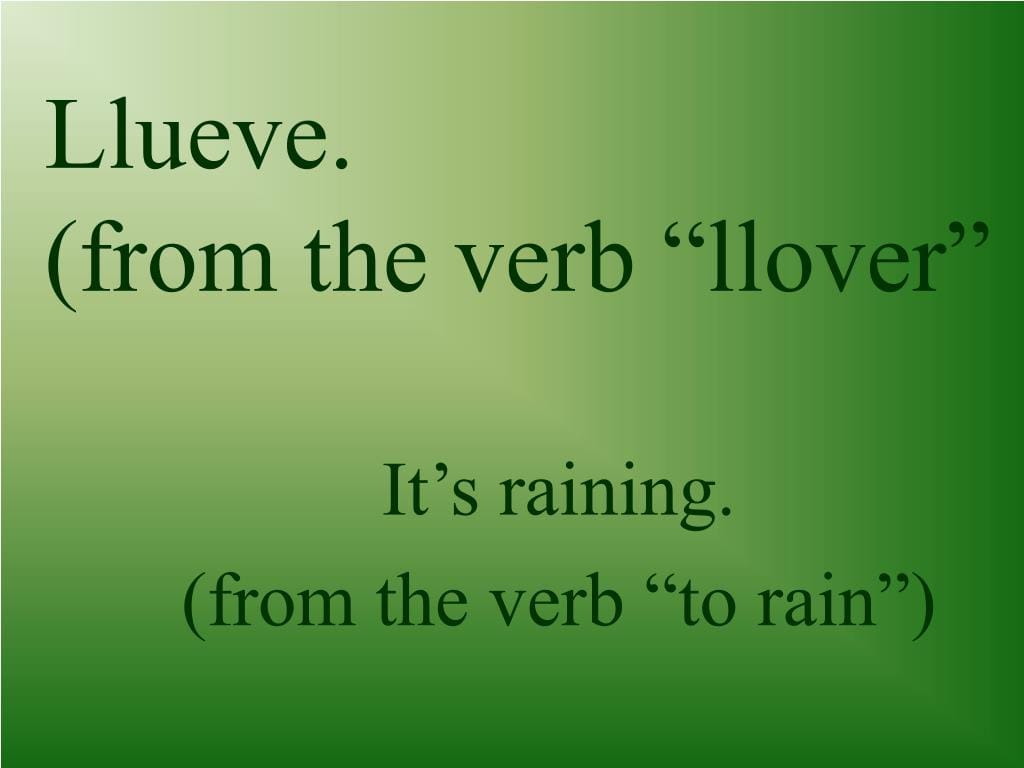This comprehensive guide will equip you with everything you need to know about conjugating the Spanish verb “llover” (to rain). From simple present tense usage to more complex constructions, we’ll cover it all. We’ll also explore common idiomatic expressions and provide practical examples to help solidify your understanding.
Understanding the Impersonal Verb “Llover”
“Llover,” meaning “to rain,” is an impersonal verb. This means it doesn’t have a specific subject performing the action. We don’t say “the sky rains” or “the clouds rain”; we simply say “it rains.” “Llover” functions similarly in Spanish. While it technically has conjugations for all pronouns, the third-person singular forms are used predominantly to describe general weather conditions. This gives it a unique grammatical character, setting it apart from other Spanish verbs.
Curious to know the conjugation of other verbs? Check out our comprehensive guides on llevar preterite and llegar subjunctive tenses.
Conjugating “Llover” Across Tenses
Here’s a breakdown of “llover” conjugations across various tenses. While all forms are listed for completeness, remember the third-person singular forms (e.g., llueve, llovió, lloverá) are the most frequently used in everyday conversation. Other forms may appear in literary contexts or to add a stylistic flair.
Present Indicative
| Pronoun | Conjugation | Example |
|---|---|---|
| yo | lluevo | (Rarely used; might imply “I am raining”) |
| tú | llueves | (Rarely used) |
| él/ella/usted | llueve | Llueve mucho hoy. (It’s raining a lot today.) |
| nosotros/as | llovemos | (Rarely used) |
| vosotros/as | llovéis | (Rarely used) |
| ellos/ellas/ustedes | llueven | (Rarely used) |
Preterite (Simple Past)
| Pronoun | Conjugation | Example |
|---|---|---|
| yo | lloví | (Rarely used) |
| tú | lloviste | (Rarely used) |
| él/ella/usted | llovió | Llovió ayer. (It rained yesterday.) |
| nosotros/as | llovimos | (Rarely used) |
| vosotros/as | llovisteis | (Rarely used) |
| ellos/ellas/ustedes | llovieron | (Rarely used) |
Imperfect (Past Continuous/Habitual)
| Pronoun | Conjugation | Example |
|---|---|---|
| yo | llovía | (Rarely used) |
| tú | llovías | (Rarely used) |
| él/ella/usted | llovía | Llovía cada día en el invierno. (It rained every day in the winter.) |
| nosotros/as | llovíamos | (Rarely used) |
| vosotros/as | llovíais | (Rarely used) |
| ellos/ellas/ustedes | llovían | (Rarely used) |
Future Tense
| Pronoun | Conjugation | Example |
|---|---|---|
| yo | lloveré | (Rarely used) |
| tú | lloverás | (Rarely used) |
| él/ella/usted | lloverá | Lloverá mañana. (It will rain tomorrow.) |
| nosotros/as | lloveremos | (Rarely used) |
| vosotros/as | lloveréis | (Rarely used) |
| ellos/ellas/ustedes | lloverán | (Rarely used) |
Conditional Tense
| Pronoun | Conjugation | Example |
|---|---|---|
| yo | llovería | (Rarely used) |
| tú | lloverías | (Rarely used) |
| él/ella/usted | llovería | Llovería si las nubes fueran más oscuras. (It would rain if the clouds were darker.) |
| nosotros/as | lloveríamos | (Rarely used) |
| vosotros/as | lloveríais | (Rarely used) |
| ellos/ellas/ustedes | lloverían | (Rarely used) |
Other Tenses and Moods
“Llover” can be conjugated in other tenses and moods, such as the subjunctive (for hypothetical or subjective situations), the perfect tenses (using the auxiliary verb “haber”), the gerund, and the past participle. Detailed conjugation tables for these can be found on resources like SpanishDict and WordReference.
“Llover” in Action: Examples and Idioms
Here are a few examples showcasing the versatility of “llover”:
- Present: Llueve. (It’s raining.)
- Preterite: Llovió anoche. (It rained last night.)
- Imperfect: Llovía cuando salí. (It was raining when I left.)
- Future: Probablemente lloverá mañana. (It will probably rain tomorrow.)
- Conditional: Si lloviera, me quedaría en casa. (If it rained, I would stay home.)
- Idiomatic: Llueve a cántaros. (It’s raining cats and dogs.) / Llueven críticas. (Criticisms are raining down.)
Exploring Deeper: Nuances and Further Learning
While the explanations provided here cover the core aspects of conjugating “llover,” linguistic research is ongoing. Some scholars suggest subtle contextual variations in usage, particularly with the future tense lloverá, which can sometimes express a conjecture about the present. For instance, if you hear the sound of rain, you might exclaim “¡Lloverá!” meaning “It must be raining!” Such nuances highlight the dynamic nature of language.
Furthermore, exploring the etymology of “llover” can offer a deeper understanding of its evolution. Its origins can be traced back to the Latin word “pluere,” revealing connections to other Romance languages.
To solidify your understanding, consider exploring these resources:
- SpanishDict: Offers interactive exercises and comprehensive conjugation charts.
- WordReference: Provides detailed definitions, examples, and translations.
- VerbMastery.com: Focuses on mastery through interactive practice.
- Linguasorb: Features audio pronunciations and quizzes.
By combining this guide with active practice and exploration, you’ll master “llover” and confidently navigate conversations about the weather in Spanish.
- Unlock 6000+ words beginning with he: A comprehensive analysis - April 20, 2025
- Mastering -al Words: A Complete Guide - April 20, 2025
- Master Scrabble: High-Scoring BAR Words Now - April 20, 2025
















